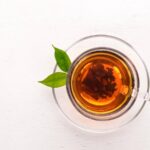Want to replace your coffee with black tea? You are curious about black tea’s caffeine level vs. coffee’s. Well, we have the answer and some more information about caffeine in black tea.
Key Takeaways
- An 8 oz cup of black tea has around 47.7 mg of caffeine.
- The caffeine content of brewed black coffee is approximately 95 mg per cup.
- Different types of black tea contain different levels of caffeine.
This article compares the caffeine concentration of different types and blends of black tea and coffee and discusses whether tea caffeine is better than coffee caffeine.
Black tea caffeine vs. coffee
How much caffeine is in black tea compared to coffee?
The caffeine content in a cup of black tea varies between 40 and 80 mg.
Specifically, an 8-ounce (240-ml) cup of black tea has 47.7 mg of caffeine, according to the USDA. By comparison, an 8-oz (240ml) cup of freshly brewed coffee has around 70–140 mg of caffeine or approximately 95 mg on average.
Note: These caffeine content values for black tea caffeine vs. coffee are averages. Caffeine levels in various types of black tea and coffee differ.
The three factors that have the most influence on the amount of caffeine in your cup of black tea are:
- When is tea harvested?
- What parts of the tea plant are plucked?
- How long is the tea steeped?
Let us examine this in further depth. Caffeine is most concentrated in the plant’s most vulnerable parts: the top leaves and terminal buds.
As a consequence, tea made just from the top two leaves and a bud, the characteristic of all high-quality tea, would contain more caffeine than tea made from relatively lower plant parts.
Additionally, spring teas have a higher concentration of caffeine than summer or fall flushes.
Reason? The tea plant’s chloroplasts are producing caffeine to defend its new growth from insect assault. Caffeine production is at a higher rate during the periods when the tea plant is most vulnerable to assault, notably immediately after its winter dormancy.
And, yes, you can influence the amount of caffeine in your black teacup.
The longer the steeping period and hotter the water, the more caffeine should enter your cup.
As the leaf steeps, it releases caffeine fairly equally. The rate of release peaks between two and three minutes then decreases to roughly eight minutes and continues for around ten minutes.
Typically, to make black tea, you should use water that is just off the boil, at approximately 210 °F (98 °C).
On the other hand, green and white teas need water that is much cooler, ranging from 165–180 °F (74–93 °C).
Steeping time for black teas is usually four to five minutes, compared to two to three minutes for green and white teas.
The caffeine content in different types of black tea

When we talk about black tea caffeine vs. coffee, we must know that there are several types of black tea.
Each one is unique to the place in which it is cultivated. Every one of these black teas is distinctive in its own way, and they all contain different amounts of caffeine.
- Assam
This particular type of black tea originates in India. The caffeine content of 1 cup (240 mL) of Assam tea varies according to steeping time but is normally between 60 and 112 mg. Due to its naturally high caffeine level, it makes an excellent breakfast choice. - Darjeeling Tea
Also referred to as the “champagne of teas.” Darjeeling tea is a black tea variety from India. A cup of Darjeeling black tea or an 8-ounce serving has between 40 and 70 mg of caffeine, which is about half the amount found in an 8-ounce cup of coffee. Yes, this also varies according to the intensity of your brew. - Yunnan Tea
This is a popular Chinese black tea variety that is also known as “Dian hong.” The caffeine content of Yunnan black tea is around 30–60 mg per cup. In comparison to Indian black teas, Chinese black teas have less caffeine. - Ceylon tea
People around the world drink this high-quality black tea on its own or in a blend with other well-known teas such as Earl Grey. Its name and place of origin are Sri Lanka, formerly known as Ceylon. The Ceylon tea brand is so well established and recognized as a mark of excellence that the tea retains its old name. Ceylon tea has between 42 and 78 mg of caffeine per 8-ounce cup.
Caffeine content of popular black tea blends
English Breakfast Tea
English Breakfast is a tea blend. The blend is prepared from loose-leaf tea from Assam, Ceylon, and Kenya. Other teas, such as Keemun (a Chinese tea), may be added to the blend to offer lighter, fruitier, and gentler overtones.
The caffeine content varies significantly across varieties. However, 30-60 mg of caffeine per cup is a reasonable estimate.
The caffeine content of a typical cup of English breakfast tea is 47 mg.
Earl Grey Tea
This is one of the most popular black tea blends with fragrances or flavors. Earl Grey’s original formulation had just two ingredients: black tea leaves and bergamot oil. Today, there are hundreds of varieties of Earl Grey tea, each with its own unique combination of ingredients.
A cup of authentic Earl Grey tea blended with black tea and bergamot fruit rinds or herbs has between 20 and 40 mg of caffeine after a one-minute steeping period.
It contains 40–80 mg of caffeine if it is perfumed or coated with bergamot oil extract.
This changes according to the kind of tea being used. If your Earl Grey has Rooibos in it, it will not have caffeine because of the Rooibos ingredient.
Black tea and coffee comparison table
Here is a comparison of the caffeine content in different types of black tea and the caffeine content of different types of coffee drinks.
| Black Tea | Caffeine (mg/8oz) |
| Assam | 60 – 112 |
| Darjeeling Tea | 40 – 70 |
| Yunnan | 30 – 60 |
| Ceylon | 40 – 80 |
| English Breakfast | 30 – 60 |
| Earl Grey | 40 – 80 |
| Coffee | Caffeine |
| Brewed filter | 96 mg/240 ml |
| Espresso double shot | 126 mg/ 59.2 ml |
| Latte double shot | 126 mg/ 59.2 ml + milk |
| Instant coffee | 63 mg/ 2 teaspoons |
| Decaf coffee | 2 mg/ 240 ml |
Note: Keep in mind that these are just average figures. The amount of caffeine in black tea and coffee can change based on the type, how it is brewed, and many other things.
Is tea caffeine better than coffee caffeine?
As previously stated, a cup of coffee has more caffeine than a cup of black tea. This may be beneficial for people seeking a fast energy boost.
Caffeine in coffee is perfect for moments when you want an immediate boost of energy and focus. Once consumed, 99% of caffeine is absorbed within 45 minutes. However, peak blood concentrations might occur as early as 15 minutes after consumption.
This is why many individuals choose a cup of coffee when they want an instant boost of energy.
While black tea has less caffeine than coffee, it does include a significant amount of L-theanine.
This is an amino acid that is well-known for promoting feelings of calm and focus. Consuming L-theanine in combination with caffeine-as in tea has been shown to aid in the maintenance of alertness, concentration, attention, and sharpness.
Thus, black tea provides a more steady and sustained energy increase, as opposed to other caffeinated drinks, such as coffee, which provide an instant energy boost.
Due to the absence of L-theanine in coffee, may help to explain why individuals often experience caffeine jitters and crashes after drinking coffee and, more precisely, why they do not generally occur after drinking tea!
How much black tea is too much?
While black tea is generally regarded as safe to consume on a regular basis, consuming more than 5 cups per day may cause negative side effects owing to the caffeine level of black tea.
Caffeine consumption should not exceed 400 milligrams (mg) per day in healthy adults.
If you are concerned about your caffeine intake, you may want to try decaffeinated black tea.
You should be aware that decaffeinated tea is NOT caffeine-free. A trace of caffeine remains in the leaf after the decaffeination procedure.
According to regulations, tea marketed as “decaffeinated” must have less than 2.5 percent of its original caffeine content, which often corresponds to less than 2 mg per cup.
Finally, when all of these things are taken into account, we can say that coffee has about twice as much caffeine as black tea.
In summary, black tea is an excellent substitute for coffee, particularly if you want a consistent and continuous energy boost without the crash and jitteriness associated with coffee.
Consider experimenting with a few different black teas to discover your new favorite.


